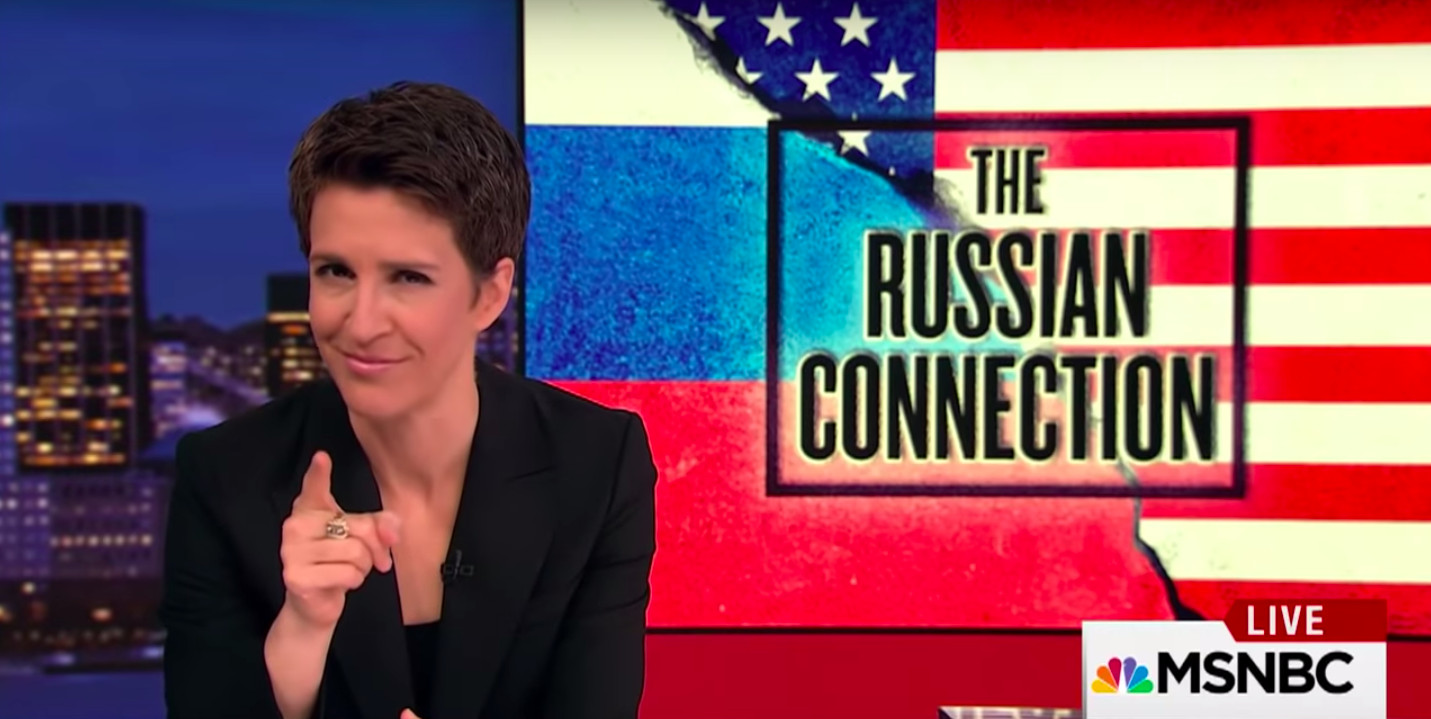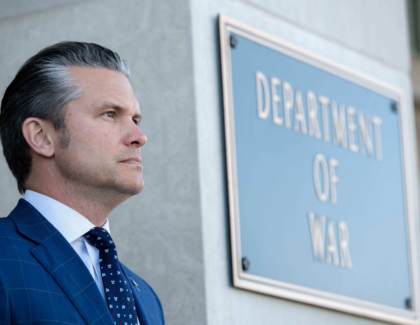Sign up for the daily CJR newsletter.
The bloodsport of Red vs. Blue party politics drives the US media. But the polarization of Blue vs. Bluer is just as striking. And there’s no better symbol of the schism than MSNBC’s most popular anchor, the pen-tapping, eyebrow-waggling, Russia-obsessed lightning rod, Rachel Maddow.
According to Adweek, The Rachel Maddow Show averaged 3.2 million viewers in November—a month that saw record “total viewer highs” for the network; Maddow goes toe to toe with Sean Hannity of Fox each night, not infrequently surpassing his numbers. MSNBC’s Twitter mentions are still thick with praise, and the New York Times ran a largely admiring profile in October.
RECENTLY: The tragic story behind a Harper’s article shows the dirty truth about fact-checking
Maddow has pursued every maddening twist and turn of the Trump Russia story with zeal: Tillerson, Cohen, Manafort, straight through to Tuesday, when a grinning Donald J. Trump appeared in the Oval Office with Russian Foreign Minister Sergey Lavrov, somehow, on the same day when House Democrats announced articles of impeachment against him. Her journalistic instincts seem to me to have been pretty sound all along; her goal is to investigate and record the details of a complex history in the making, as truthfully as she can.
But for years, stories in left-leaning publications (The Intercept, In These Times, The Nation, and Slate among them) have joined the right in lobbing brickbats in Maddow’s direction. They argue that Maddow’s obsessive coverage of Trump and Russia is irresponsibly sensationalist. That it panders to a crowd of disappointed Hillary Clinton supporters , who are eager to blame the Russians for her loss in 2016.
Maddow’s most ferocious critic is perhaps Glenn Greenwald of The Intercept, who wrote in March: “Rachel Maddow is the Judy Miller of the Trump/Russia story… way off the deep end, in another universe totally devoid of basically rationality [sic].” The Russia story is “this generation’s WMD,” according to Matt Taibbi, who compared Maddow’s coverage to “McCarthyism and fearmongering.” Willa Paskin mocked Maddow in Slate for having “conspiracy brain” and looking like she’s “on the verge of a nervous breakdown.” She openly accused her of deliberately misleading her audience.
Critical voices like these dovetailed neatly with, for example, National Review editor Rich Lowry’s mockery of Maddow’s “delusion” last March in Politico, where he called her “a hero of her own spy-thriller [sic]” and complained about her “breathlessness.”
A substantial number of reporters and pundits were disappointed (wrongly, in my view) in the results of Robert Mueller’s Trump/Russia investigation, and that prompted a lot of the attacks on Maddow. But Mueller’s report and testimony did not remotely exonerate Trump. His painstaking, un-flashy work opened the door for other investigators, and for the saner elements of the press.
Others on the left have argued against the political approach, for example David Klion, who’s long contended that Trump/Russia is simply a story of international oligarchs escaping justice—a more Maddow-like position. In an incisive counterpoint to Greenwald in Mother Jones, Klion described Trump/Russia as “the story of a presidential candidate who has surrounded himself throughout his life with crooks and grifters, and of a Republican Party that didn’t care,” aptly observing that Greenwald’s 2011 book on the culture of elite immunity from the law, With Liberty and Justice for Some, bears an enthusiastic blurb from none other than Maddow.
IT’S WORTHWHILE TO RECALL that the Trump/Russia fractures on the left came straight out of Hillary Clinton’s defeat in 2016.
On one hand, the intelligence agencies arrived at an ironclad consensus in the summer of 2018: US foes in Russia attempted to interfere in the 2016 election on behalf of Putin’s favored candidate, Donald Trump—a stone-cold fact that Clinton and her centrist supporters remind everyone of every chance they get. The suspiciously small margins by which Trump prevailed in Wisconsin, Michigan and Pennsylvania give some oxygen to this view.
On the other, the facts also support the contention on much of the left: that the hawkish Clinton was an extremely weak candidate who ran a catastrophically flawed and uninspiring campaign, and thus bears the responsibility for her own failure, Russia or no Russia.
It seems silly to have to say so, but there can be more than a single reason for a political outcome, and even one’s fiercest opponents can be partly right. The larger point here, though, is that Maddow’s long focus on the Trump/Russia story shows no sign of ever having had anything to do with Clinton or the election, or of having political motives at all. And tracing the coverage back, it’s clear that Maddow hasn’t really gotten much wrong. The contrary, in fact. The political posturing has done nothing more than take our eyes off the ball in favor of partisan bickering.
Given that Maddow’s critics have basically accused her of style over substance, their criticism itself turns out to be pretty insubstantial. With all the worrying about how bad it would look for Maddow if there were no collusion between Trump and Russia, few have stopped to think how bad it will look for the Russia-skeptics if she turns out to have been right.
THE FIRST MENTION of Trump/Russia on the @maddowblog Twitter account came on July 18, 2016, with a link to a Washington Post story by Josh Rogin, “Trump campaign guts GOP’s anti-Russia stance on Ukraine.” Strikingly, months before the election, Trump was already working to ensure that the new Republican platform wouldn’t call for giving weapons to Ukraine to fight the Russians, “contradicting the view of almost all Republican foreign policy leaders in Washington.”
The Ukraine amendment proposed back then read, in part, “Today, the post-Cold War ideal of a ‘Europe whole and free’ is being severely tested by Russia’s ongoing military aggression in Ukraine… The Ukrainian people deserve our admiration and support in their struggle.” But Trump’s staffers had the issue tabled, and succeeded in watering down this language. “I was troubled,” Diana Denman, the RNC platform committee member who’d proposed the amendment, told the Post. “I said, ‘What is your problem with a country that wants to remain free?’ It seems like a simple thing.”
When one considers the distance between that Republican Party and the one we’ve got now, it’s difficult to contend that Maddow has ever oversold either Trump’s affection for Putin, or the harm it’s caused the United States and the West.
In July, Krystal Ball wondered aloud at The Hill how much her former colleagues at MSNBC, “nearly all of whom got swept up in the ratings bubble that was feverish Russian conspiracy theories,” might have “damaged the left.” “Rachel Maddow, you’ve got some explaining to do,” she said.
But then Ball went on to admit that “the President’s team clearly sought to work with Russia, they used Russian illegal activity to their own benefit, and then they lied about the whole mess to cover it up, those are the facts, and it is a damning set of facts.” So what was the problem? “Building anticipation of a big reveal,” “fevered speculation,” and “wild theory,” apparently. Ball then compared Maddow to noted conspiracy theorist Louise Mensch (of “Marshal of the Supreme Court” fame).
“How is this journalism?” she demanded.
I don’t know. But as a concerned citizen I’m intensely interested in the fact that there’s a sitting president who is known to have wrangled private meetings with Putin and is seeking more of them, and who, over the objections of Congress, the intelligence agencies and even the military, has been extremely consistent in furthering Putin’s objectives for nearly three years.
How exactly is Rachel Maddow or anyone else supposed to comment on this necessarily complicated and deadly serious political situation? I’m not the biggest fan of the conspiratorial tone, but isn’t “obsession” the correct response to the staggering facts, here?
“I’m happy to admit that I’m obsessed with Russia,” Maddow told Amanda Hess at the Times. “I realize it’s controversial, and people give me a lot of grief for focusing on it. But I make no apologies. I think it’s absolutely compelling. Still mysterious. Super interesting.”
ICYMI: The case of a viral video shows how quickly the press can abandon ethics
Has America ever needed a media defender more than now? Help us by joining CJR today.







